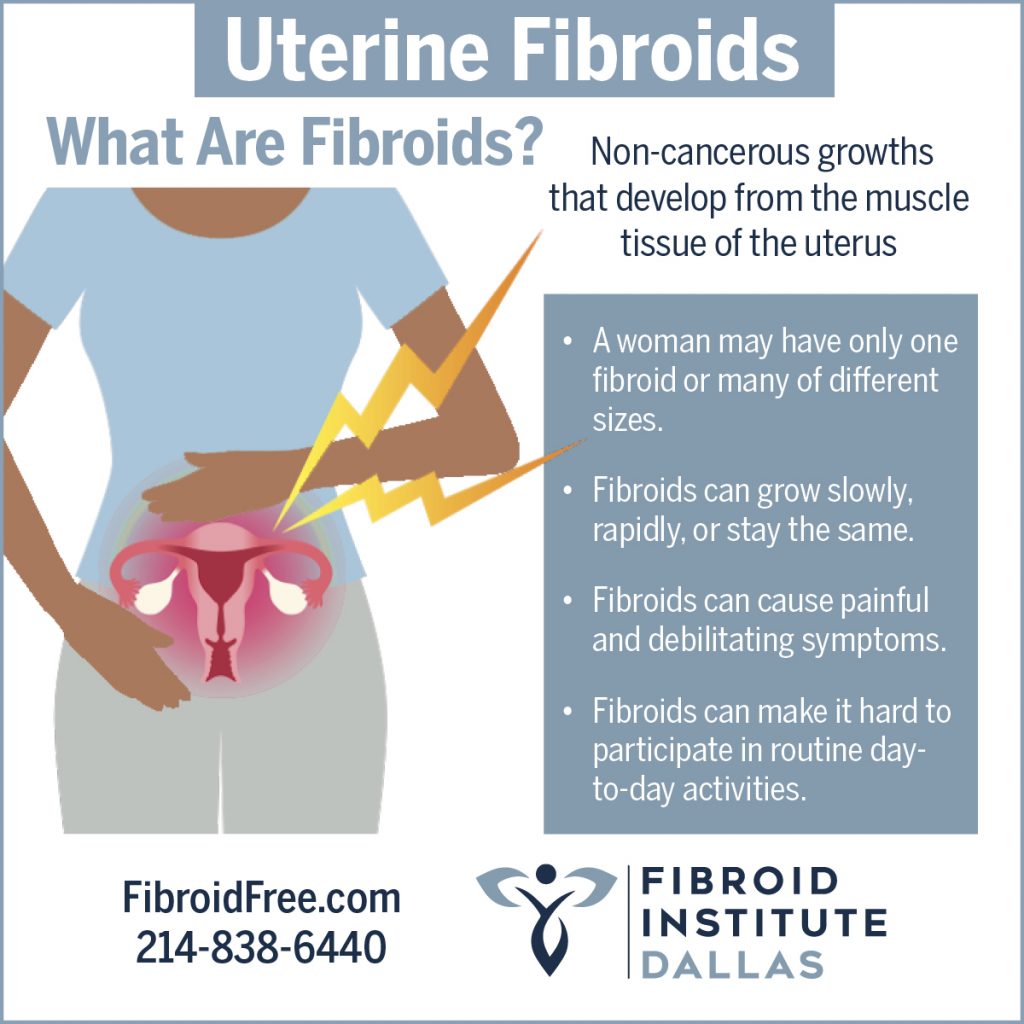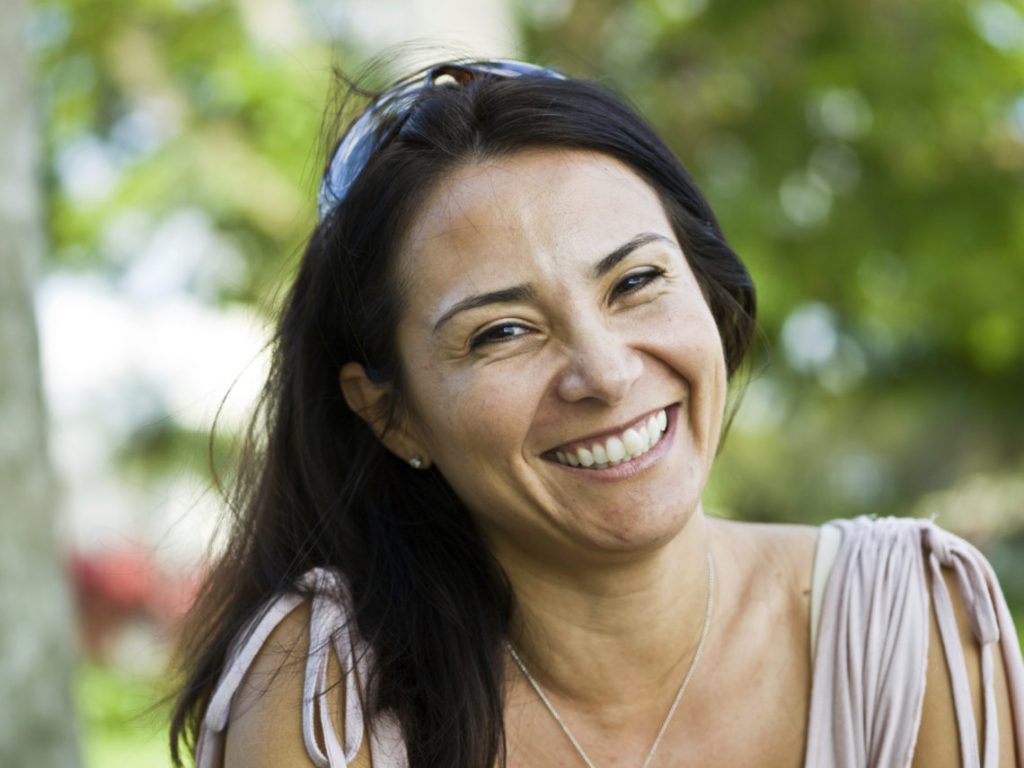Uterine fibroids were affecting Yelitza’s daily life. She felt ongoing pelvic pain. Her monthly periods were heavy, and she was passing blood clots. Her other symptoms included frequent urination, a feeling of heaviness in her abdomen and stomach discomfort. Yelitza was uncomfortable and in pain, leading to moodiness and insomnia. The excessive bleeding caused anemia. This required an iron supplement to maintain healthy levels. All these symptoms left her feeling heavy, lethargic, and annoyed. She did not like missing out on family activities and exercising. Plus, Yelitza hated watching her tummy get bigger as the fibroids grew. Her mother had a hysterectomy for fibroids removal, but Yelitza was hoping there was a non-surgical way to get her life back.
In her search for fibroid treatment, Yelitza went to three different OBGYN doctors to learn about her options. All three recommended hysterectomy for fibroids removal due to the size of her fibroids. But Yelitza knew that surgical hysterectomy was not the way for her. She tried one more doctor who listened to her concerns and referred her to Dr. Suzanne Slonim at Fibroid Institute Dallas.
What Are Fibroids?
Uterine fibroids are abnormal growths in the uterus that affect three out of four women, most often between the ages of 35 and 54. However, fibroids can occur in women younger than 35 and until menopause. They do not always cause problems and are often discovered during routine health testing. Although usually benign, fibroids may lead to life-altering symptoms, such as severe abdominal pain and heavy periods.

Fibroid symptoms can include:
- Periods that last longer than a week
- Excessive menstrual bleeding or spotting
- Bloating
- Weight gain in the abdomen, giving an appearance of normal belly fat
- Anemia
- Difficulty lying face down, bending over or exercising without discomfort
- Constipation, bladder control issues
- Dull, chronic pelvic pressure and pain
Yelitza made an appointment for a consultation with Dr. Suzanne Slonim. She learned about Uterine Fibroid Embolization (UFE) as a non-surgical alternative to hysterectomy fibroids removal. Fibroid Institute Dallas determined that she was a good candidate for the UFE procedure. She appreciated the professionalism and patience of Dr. Slonim and her staff. “They explain everything so well that it gives you confidence and peace of mind.”
What Is UFE?
UFE is a non-surgical treatment that uses tiny particles to cut off blood supply to the uterine fibroids. This causes them to shrink and disappear while preserving the uterus. Covered by most insurance plans, UFE is attainable for many patients. After UFE, 90% of women see major improvements in their symptoms.
Just a few more advantages of UFE include:
- Recovery time is only about a week versus six weeks or longer for surgery
- In-office procedure instead of hospital stay
- Procedure typically takes less than an hour
Fibroid Institute Dallas has the most advanced safety equipment and technology required for UFE. Dr. Slonim can perform the procedure in an office setting instead of requiring patients to go to the hospital. During the procedure, a tiny puncture is made in your left wrist. Next, a very small catheter is inserted through this into your artery. The doctor uses X-ray guidance to locate the uterine arteries and vessels that supply blood to the fibroids. Then, she injects small particles into the vessels. These block the blood flow to the fibroids, causing them to shrink.

Since it is non-surgical, UFE is less invasive than traditional fibroids removal surgeries. On average, patients are back to their normal lives in 7 to 10 days. For patients who are concerned about pain during recovery, Dr. Slonim developed a unique approach to pain management that significantly reduces discomfort as fibroids shrink. Plus, Dr. Slonim and the Fibroid Institute Dallas staff guide patients through the entire process, from consultation through post-procedure follow up visits.
Yelitza Recommends Dr. Slonim and Fibroid Institute Dallas
Yelitza chose to have the UFE procedure with Dr. Slonim, and not fibroids removal by hysterectomy. And she is so glad she did! After just a few days she felt a huge improvement. “Little by little I was recovering my energy, my periods are much better now, I feel lighter, active and I don’t go to the bathroom so often.” At her one month follow up appointment, Yelitza was still feeling slight pain in her lower back area, but it was managed with over the counter medication. Dr. Slonim explained that the fibroids were continuing to shrink, and the pain would reduce over time.
Yelitza and her husband are both happy with the decision to choose UFE over hysterectomy for fibroid treatment. Both felt that Dr. Slonim and her staff took excellent care of Yelitza. “They are professionals and they take care of you from the first moment, they explain each step of the procedure in detail with the pros and cons and that gives you confidence.”

Yelitza recommends contacting Fibroid Institute Dallas for any woman suffering from fibroid symptoms to see if they are a candidate for UFE. And her best advice for UFE patients? “I would tell you that following all the recommendations and steps to the fullest as indicated by the doctor will make the procedure a success.”
Take the Next Step to Living Fibroid Free
Do you suffer from fibroids? Has your doctor recommended surgery for fibroids removal? Educate yourself about the non-surgical fibroid treatment UFE at Fibroid Institute Dallas. If you are a good candidate for UFE, you can schedule your consultation with Dr. Suzanne Slonim and get your questions answered. An award-winning fibroid doctor in North Texas, Dr. Slonim has performed over 30,000 procedures in 25+ years. Join the thousands of women who have been treated by Fibroid Institute Dallas and are now living #FibroidFree!
Call for a telehealth consult or an in-office appointment at 214-838-6440 or complete the form below.
*names and/or photos may be changed to protect patient confidentiality
Fibroid Institute Dallas serves the DFW area including Fort Worth, Grand Prairie, Arlington, Hutchins, Irving, Duncanville, DeSoto, Cedar Hill, Lancaster, Cockrell Hill, Highland Park, University Park, Park Cities, Garland, Mesquite, Richardson, Dallas, Addison, Carrollton, Plano, Frisco, McKinney, Allen, and all of North Texas.
This information is not a substitute for professional medical advice. Prior to starting any new treatment or if you have questions regarding a medical condition, always seek the advice of your doctor or other qualified health provider.

